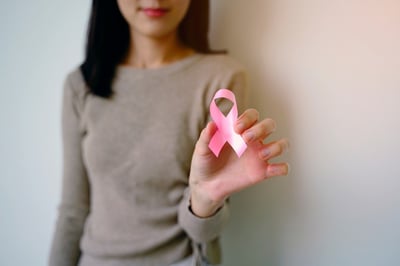Study for Women at Increased Risk of Developing Breast Cancer

This study will create a system to assess an individual’s risk of breast cancer
Clinicaltrials.gov identifier:NCT00291096
Study Contact Information:
For additional information, please contact: Bruce Kimler, PhD by phone 913-588-4523 or by email [email protected]
About the Study
This study will create a system to assess an individual’s risk of breast cancer based on random sampling of normal breast tissue as well as determine new and help understand previously identified risk biomarkers. Risk biomarkers are measurable substances in the body that suggest an individual might have a disease like breast cancer.
This Study is Open To:
Women 35 to 60 years old (or within 10 years of youngest age of diagnosis of breast cancer in a first degree relative) who are at high risk of developing breast cancer and who are:
- More than 6 months from antihormonal therapy (drugs that are used to block ), such as Tamoxifen
- More than 1 year from pregnancy, lactation, or chemotherapy
- Willing to have a 6 months before periareolar fine needle aspiration (RPFNA)
- Willing to have blood drawn
- Not taking NSAIDS, such as aspirin or ibuprofen, or herbal supplements
This Study is NOT Open To:
People who do not meet the inclusion criteria defined above and those who:
- Have cancer, cancer that has spread to other parts of the body
- Have breast implants or flap reconstructions
- Have had radiation to both breasts
- Have had a current or clinical breast exam suspicious for cancer
What the Study Involves
Participants will maintain contact with the researchers for the length of the study. Participants will provide demographic information, biological samples, and other data. The biological samples include blood, breast tissue obtained by random periareolar fine needle aspiration (RPFNA), where a small amount of breast tissue is removed using a thin, hollow needle, and nipple aspirate fluid (NAF), where fluid is drawn from the breast using a special pump. Participants’ risk biomarkers, breast density, and lifetime risk of breast cancer will be collected. Participants may have genetic testing.
Study Site
Kansas
University of Kansas Medical Center
Kansas City, Kansas
Contact: Bruce Kimler, Ph.D. 913-588-4523 [email protected]
Study Contact Information:
For additional information, please contact: Bruce Kimler, PhD by phone 913-588-4523 or by email [email protected]
This study will create a system to assess an individual’s risk of breast cancer
Clinicaltrials.gov identifier:NCT00291096
Study Contact Information:
For additional information, please contact: Bruce Kimler, PhD by phone 913-588-4523 or by email [email protected]